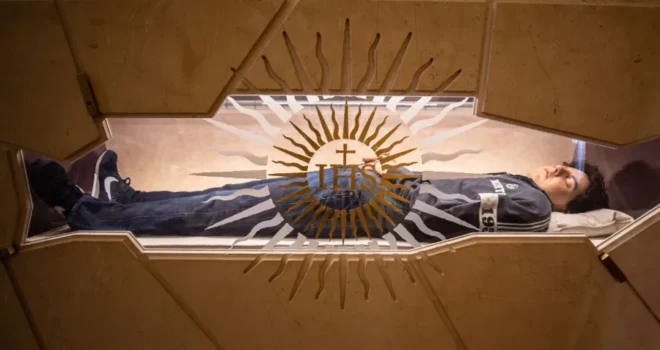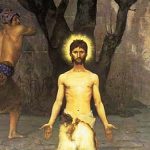The history of the Church is filled with figures who, through their lives and works, have witnessed the transformative power of the divine encounter. Among these, servant of God Don Dolindo Ruotolo stands out—a Neapolitan priest whose autobiography, I Was Called Dolindo Which Means Sorrow, reveals an intimate and profound dialogue with Jesus—and the young St. Carlo Acutis, whose brief earthly existence was a shining example of Eucharistic love and the use of modern means of communication to spread the Faith.
Don Dolindo was blessed with many interior locutions from Our Lord, Our Lady, and a few saints. Out of humble obedience to Church authority, he instructed his spiritual children to regard these communications simply as edifying spiritual readings rather than presuming divine inspiration before ecclesiastical approval.
Through the pages of his autobiography, Don Dolindo introduces us to the “Work of God,” a divine design communicated to him directly by Jesus during intense revelations. This “Work” is not configured as a specific institution or external activity, but rather as an interior movement, a pressing invitation to the glorification of the Father through union with Christ in the Church. Reading the words of Jesus addressed to Don Dolindo, it emerges strongly how the Eucharist constitutes the beating heart of this “Work.” In the same way, the life of St. Carlo Acutis appears as a luminous testimony of how a profound Eucharistic devotion can become the driving force of a holy life and fruitful apostolate.
Jesus repeatedly urges those who love Him to join Him in this great work of life:
If you love Me therefore, O My “little sheep,” unite yourselves to Me in this great work of life, unite yourselves to My glorious Church, which is one, holy, which is catholic, apostolic; unite yourselves to the Pope, to the priesthood, to all that derives from Me, and you will glorify My Father. This is your sublime mission on earth.
For Don Dolindo and for those who are called to participate in this “Work,” the privileged way to glorify the Father passes through the acceptance of suffering and humiliation, offered in union with Christ. Such humility becomes the fertile soil where the seeds of divine grace can flourish.
In the context of the “Work of God,” the Eucharist assumes a central role, presenting itself as the privileged modality through which Jesus gives Himself to humanity and makes possible participation in His work of glorification of the Father.
The Eucharist is presented as the true pasture prepared by Jesus for souls: “I am their shepherd because I guide them to the true pasture that I prepare for them in the Most Holy Sacrament of the Altar.”
Jesus emphasizes how in the Eucharist He gives Himself completely to man: “In the Eucharistic Bread I give Myself to man to take possession of him; in the divine word I give Myself to him to truly make him in the image of God.” This real presence is not a simple ceremony, but a source of life and transformation for souls.
This living faith in the Eucharist that transforms souls finds a contemporary witness in St. Carlo Acutis (1991-2006). His brief but intense life presents itself as an extraordinary example of how the Eucharist can shape an existence and make it an instrument of evangelization. From an early age, Carlo manifested a deep and zealous love for the Eucharist, which he defined as his “highway to Heaven.” His day was rhythmed by participation in Holy Mass and Eucharistic adoration.
Carlo did not keep this treasure to himself; he felt the urgency to share it with others. He intuited the power of the web and used his computer skills to create an impressive virtual exhibition on Eucharistic miracles around the world, a work that continues to touch the hearts and strengthen the faith of countless people.
Carlo Acutis’s life was a silent but eloquent testimony of how the encounter with Jesus in the Eucharist can transform a normal boy into an example of holiness for our time. His simple and joyful faith, his love for the poor, and his ability to use modern means of communication for the Gospel make him a particularly significant figure for the young people of the third millennium.
When we contemplate these two souls separated by time yet united in devotion, we discover a profound connection. The common thread that binds the spiritual experience of Don Dolindo and the testimony of Carlo Acutis is the Eucharist, the inexhaustible source of grace and a privileged means for the glorification of God. For Don Dolindo, the Eucharist is the heart of the “Work of God” revealed to him by Jesus, the place where Christ gives Himself to vivify souls and make them capable of glorifying the Father; for Carlo Acutis, the Eucharist was the center of his spiritual life, the driving force of his apostolate, and the secret of his holiness.
The words of Jesus to Don Dolindo resonate with Carlo’s life: “You must breathe My breath, you must live by My heartbeats, you must have My activity, and you can draw it only from the most holy Eucharist.” Carlo lived this invitation with total dedication, nourishing his soul with the Body and Blood of Christ and allowing himself to be shaped by His presence.
Both show us how living faith in the Eucharist is not an isolated act, but a transformative encounter that involves all of existence. It leads to a greater love for God and for neighbor, to a desire to do His will, and to an awareness of one’s own insufficiency in the face of His greatness. The humility of Don Dolindo, who defines himself as a “most vile worm and nothing more,” and the simplicity of Carlo, who lived his faith with genuineness and without ostentation, are two sides of the same coin: the awareness that all good comes from God and that our mission is to let ourselves be loved and transformed by Him.
The experience of servant of God Don Dolindo Ruotolo and the testimony of St. Carlo Acutis offer us a profound reflection on the central role of the Eucharist in the life of the Christian and in God’s plan of salvation. The “Work of God” revealed to Don Dolindo finds a wonderful echo in the life of Carlo, a young man who made the Eucharist the heart of his existence and the instrument of his apostolate.
Both invite us to rediscover the beauty and power of the Eucharistic mystery, not only as a sacrament to be received, but as a living presence of Jesus who desires to transform our lives and make us capable of glorifying the Father. The holiness of Carlo Acutis, sprouted from an authentic and contagious Eucharistic love, is a sign of hope for our time, a confirmation that the “Work of God” continues to be realized in souls that open themselves with faith and love to the encounter with Jesus in the Bread of Life.
Author’s Note: If you would like to read more about Don Dolindo’s spirituality, check out those books: Don Dolindo’s Books.
Ruotolo, D. (2020). Fui chiamato dolindo che significa dolore. Pagine di autobiografia. Casa Mariana Editrice. Apostolato Stampa.
Image from Wikimedia Commons















